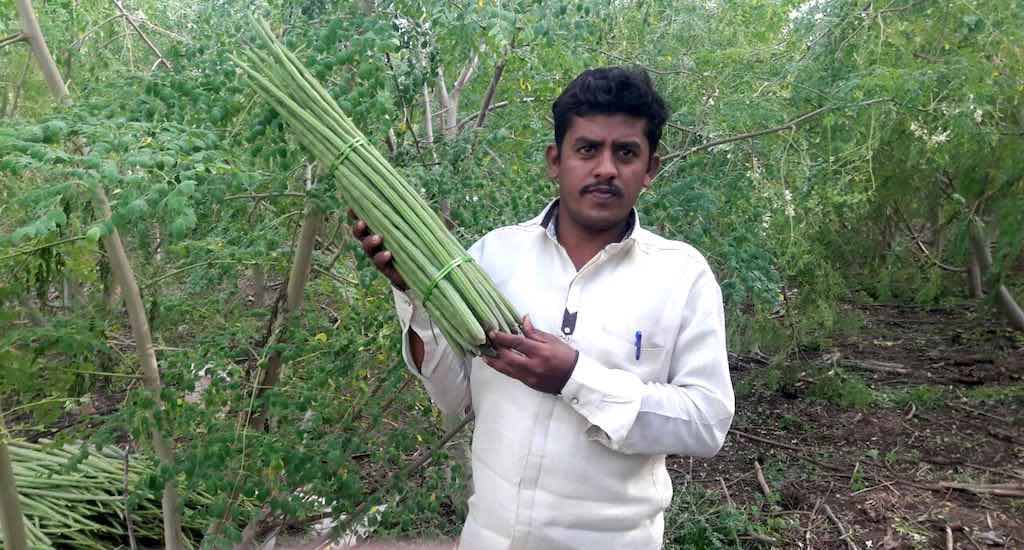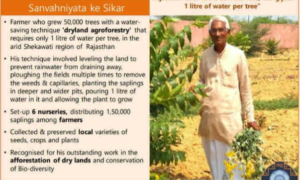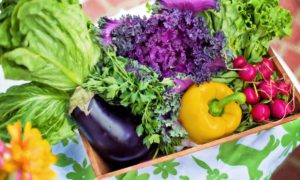Farm to Finger: Stories of Kitchen Gardens

“I decide what is to be cooked in my house for my family consisting of my two children, my in-laws and for all of us” says a lady with a soulful smile in Kuhika village, belonging to Sukinda block of Jajpur district in Odisha.
She is proudly growing her family’s veggie basket need in her kitchen garden since last two years.
She cultivates all seasonal vegetables with
greens and others to address their vegetable requirement.
She also has a small poultry farm in her back yard, that earlier used to remain fallow throughout the year.
The diversified veggie basket, leads to less dependency on the market for the daily need of the family food security and ultimate results in generation of savings and in the process creates happy smiles in the faces of the ladies in this region.
The nutrition awareness in the region among the ladies and the provisioning of backyard
gardening in organic way has boosted the morale of many women led self-help group
members and has created an environment where women have started taking decisions at
the family level.
In broader sense it has always been the prerogative of the lady to decide what to eat as long as the community members were growing their own food.
However, for the last few decades most of them had become dependent on market and were spending large part of their wage income to buy vegetables.
This has been possible because of the support of government as well as Tata Steel Foundation to promote kitchen garden in this
region.
The major source of income in this part of Odisha primarily comes from mining related
activities and wage related activities.
Complete dependency on the market has made the people vulnerable to the vagaries of market like quality and quantity of food available for the family consumption need.
However, the narratives of market dependent economy changed with the onslaught of the pandemic followed by the lock down and shut down episodes.
“No work, no payment” modus operandi laid to, many workers without any source of income, thus having detrimental impact on the house hold level food security.
Food security at the family level depends on the availability of food, access to food and
utilization of food by our body.
The first two factors of the food security got seriously impacted by the shutdown measures adapted by the government in various phase of corona virus pandemic.
The reduced availability of food in the market owing to the measures of pandemic, along with the factors of inflation resulted in the rise in the prices of the food
items.
This created food scarcity at the local market and the situation got aggravated further by the reduced income and inflated price of the limited food items. Even though there was free distribution of rice for the people, the protein and the micro-nutrient content in the food was severely missing.
Nutritious food has a critical role in enhancing immunity of the body, helps in cognitive development and ultimately boosts the productivity of the individuals.
Healthy food consisting of dietary diversity is critically important for the children in different age group.
Children transform from infants to young adult, undergoing through multiple changes and requires various nutritional diet at different stages of these transitions.
This need was earlier addressed by the food diversity the communities were enjoying when they were growing their own food.
Further to this there was also a lot of sharing of food items amongst the communities which vanished with the introduction of market.
This got further aggravated because of the pandemic related closure of economic activities.
This affected badly the food security at the household level.
During such hour of critical food security crisis at grass root level, the state government run “Mo Upkari Bagicha” scheme, with the help of SHG at the grass root level in all the 314 blocks of the state, helped to address the food need at the house hold level.
The backyard gardening scheme addressed the diversity of food basket requirement of the family with special emphasis on organically grown fruits, vegetables and animal rearing.
Nutritional awareness promotion through the SHGs helped the women to take the lead in addressing the quality of food required at the house hold level.
The scheme specifically highlighted the
issue of scanty availability of backyard areas of poor house hold and accordingly envisaged plan for circular, rectangular and non-land back yard farming technique.
In order to strengthen the dietary diversity at the family level, families are motivated to develop nutrition garden with 13-17 varieties of green vegetables and up-to 10 varieties of fruit bearing saplings.
For the protein rich diet need families are motivated for animal rearing and fish cultivation in their back yard.
Malnutrition, under nutrition and anemia are the serious challenges in the development
milestones of the children in the state of Odisha.
The market driven food basket restricted the diversity of food because of the commercial viability and affordability issues and on top of this the quality is compromised as the food is grown at large scale with the use of chemical fertilizers and pesticides.
Limited resources and scanty availability of food items at the house hold put the woman of the house in dilemma to make the appropriate provisioning of food need of her family members.
The promotion of back yard gardening schemes of the government of Odisha in these
difficult time with the help of SHGs, provided the women the opportunity to grow their own food in organic manner and satisfy the family food need.
This has generated multiple benefits at the grass root level; such as enhanced nutrition awareness, organically grown food basket, ensured food security and more importantly helped the women to take decision at the family level.
This has not only addressed the food need of the communities but also facilitated women’s empowerment in a very strategic manner.
Healthy body and mind are an essential for a dignified life and in this process of developing the human resource in Odisha, “Mo Upakari Bagicha” will surely play an important role in building a culture of growing one’s own food in a sustainable manner.












































